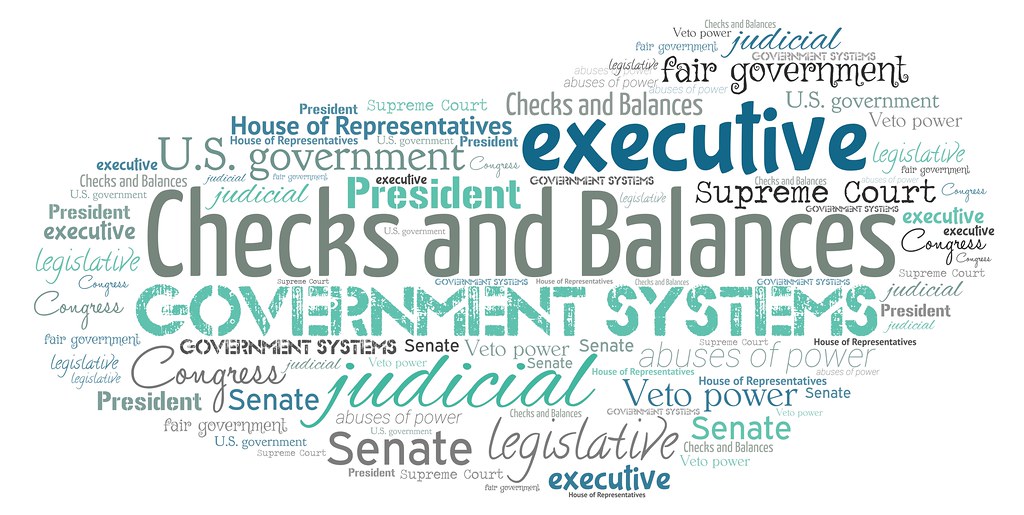Opinion: Checks And Balances In Amherst Town Government. Reflections By A Soon-To-Be-Former-Councilor On How This Town Council Fails To Meet The Promises Of The Charter, Democracy, Transparency, And Public Participation (#3)

Photo: Flckr.com (CC BY 2.0)

Checks and balances are a cornerstone of democracy. The point of providing checks and balances in the Amherst Home Rule Charter was to make sure neither the legislative branch (the town council) nor the executive branch (Town Manager Paul Bockelman) exercised too much power. When the Charter Commission decided not to go with a mayor, many worried that the alternative —the council/Manager form of government — provided too much power to an unelected official. And guess what? It does! Especially when that power is unchecked.
What The Charter Commission Promised
Checks and balances: As with our current system, we will continue to have citizen representatives as a check and balance on the actions of professional staff…
In addition, the Town Manager’s appointments of department heads and members of boards and committees will need to be approved by the Town Council.
What We Have Seen: An Unholy Trinity: Town Manager, Council, And Business Improvement District
Yes, the town manager was given too much power under the Charter. I believe that problem could have been managed, but instead it has been exacerbated by the fact that the majority on the council are working in tandem with the manager in most respects, thus removing any willingness to check his actions. Add in the Business Improvement District (BID) and you have an unholy trinity, all working together to steamroll their agenda. There have been few if any instances of the council failing to accept a recommendation made by the town manager or directing him to do anything he wasn’t going to do anyway.
Unchecked Power Over The Budget
On the budget, the town manager is all powerful and is unchecked by the council.
Although the Finance Committee provides budget guidelines before the manager presents his annual budget, it routinely rubber stamps his recommendations. There was great reluctance to take up troubling questions about the library expansion proposal and the lack of data provided for a repair estimate. Because there was a pre-established narrative that the town would approve four major capital projects, the Finance Committee went out of its way NOT to explore the many holes in that narrative or concerns about other needs that were not being addressed because of that narrative.
Unchecked, Un-transparent Appointment Process
The appointment process is another area where the council has not checked the manager’s lack of transparency. The town manager has the power to make applications for positions on committees public records, which would provide a transparent pool and give the council the ability to provide a meaningful approval process, as is done in Northampton. Doing so would enable the council to compare applicants and to discern trends or biases in appointments. As it is now, there has not been one recommended applicant that has not been rubber stamped by the council. Recently, the council has even put appointments on the consent agenda, meaning that we don’t even consider them separately at council meetings. We just vote to approve them all en masse. The council could, if they chose, reject appointments to force the manager to open up the process. They could also direct him to do so in the town manager goals that they write and review annually.
Un-transparent Meetings
The council has not challenged the town manager’s lack of transparency about important meetings that may be shaping the future of the town. The manager meets regularly with UMass. Though the council president frequently attends those meetings, she does so on her own, not as a representative of the Council, and neither of them keep the full council or the public abreast of those conversations. The manager also sits on the BID board, meeting weekly, and does not report those conversations. This may not offend the majority, based on their unholy alliance with him, but the rest of us — and the public — would like to know what is going on.
Unchecked Power Over Legal Counsel
The council has not challenged the town manager’s control over access to legal counsel. Though the council employs the town manager, it somehow can’t ask for legal advice directly, apparently because the agreement with KP Law is with the town manager. When the manager asks for a legal opinion, it is to support his view. Councilors who do not agree with his view don’t have access to independent counsel to either support their views or to request a neutral view on an issue. This came up with the Jones Library discussion at the Board of Registrars (BOR), where KP Law provided only the town’s view of the petitioners’ case to the BOR members. The resident petitioners’ rights and position needed to be expressed to the BOR by independent counsel, which they happened to be fortunate enough to have. It is sad that the town clerk repeatedly tried to block independent counsel from speaking, to the extent that a motion had to be made, and a vote taken, every time there was a request for the petitioners’ counsel to be heard.
Unchecked By Annual Town Council Evaluation
One of the most important means of checking the power of the town manager is through yearly evaluation. However, the council has not used this power to ensure an unbiased, independent yearly evaluation. Very early on, the council president took over conducting the town manager evaluation process herself, including writing up the annual cover letter to the evaluation, the content of which is the main thing the public and the media see. Because she meets with the town manager on an almost daily basis, and requires a smooth working relationship with him, it is difficult for her to be neutral when conducting the evaluation. To provide the kind of check needed, the councill should ensure that an unbiased annual evaluation be done by a neutral party or non-political committee.
Unchecked By Staff Evaluation
In a demonstration that she is not neutral, the president of the council made an aggressive effort to cover for the town manager regarding the high turnover of staff at Town Hall. It is an open secret that staff are overworked. There are way too many staff who have left to say that there is no pattern and that the problem is COVID-related. Staff turnover has been happening since before COVID-19 started. An example is our first clerk, Margaret Nartowicz, who testified to the Finance Committee in the spring of 2019 for the clerk’s office that she was doing the work of two people, and that we needed to fund two clerk positions. The town manager then responded that he planned to fund just the one position. Nartowicz’s notice to leave us appeared within a few days.
So what does a lack of checks and balances mean to the average Amherst resident? It means you will get whatever is steamrolled through by the Amherst Forward PAC-endorsed majority, without respect for how many other voices are chiming in. It means you are less likely to be able to serve on a town committee if you are not in the favored party. It means you will not know much of what is going on because an accepted lack of transparency allows the agenda to fly through.
You would think this would come out in staff evaluations, but those evaluations have been neglected and purposefully downplayed by the council, ostensibly because few staff have participated in the past, providing insufficient data with which to generalize. However, no believable effort has been made to ensure a better showing and to give staff confidence that the process will be anonymous within the annual evaluation process, though there is a clear need to hear from staff. It feels like the council is covering for the manager here. (A recent, separate survey of staff regarding why so many are leaving was accompanied by a parallel survey to show why other staff are staying.)
The real fault is with the council, which is entirely unwilling to hold the manager accountable or even to engage in reasonable oversight. This has set a terrible precedent.
So what does a lack of checks and balances mean to the average Amherst resident? It means you will get whatever is steamrolled through by the Amherst Forward PAC-endorsed majority, without respect for how many other voices are chiming in. It means you are less likely to be able to serve on a town committee if you are not in the favored party. It means you will not know much of what is going on because an accepted lack of transparency allows the agenda to fly through. If you are staff, it means you will not get to participate in a meaningful evaluation of your boss. If you are a resident, it means you can’t trust the town manager evaluation to be unbiased.
Things Don’t Have To Be This Way
Even under a charter that gives the town manager too much power, things could be far more open, more transparent, more accountable, and more representative. There’s nothing in the charter that prevents it. But there is plenty inherent in one-party rule — when the one party includes both the council majority and the town manager, unchecked by each other — that does. If you want a change, vote the incumbent Amherst Forward councilors out: Mandi Jo Hanneke, Andrew Steinberg, Evan Ross, and George Ryan.
Next week, I will take up the power balance among councilors. (And you will be happy to learn that the series has been expanded to five parts.)
Darcy DuMont is a member of the Amherst Energy and Climate Action Committee, founding member of Local Energy Advocates of Western MA and an Amherst Town Councilor representing District 5. Views expressed are hers and not those of the Town Council.

This is an important document, essentially an indictment of the current Charter and its implementation by the Manager and Council majority. The departure of an outstanding former Clerk, the more recent mishandling of the voter veto petition, and the lack of transparency around committee appointments and in reporting on meetings are significant matters. When already-appropriated transit funding was withheld in the first year after the Council came into office, I charitably attributed that to the chaos of transition; but in hindsight that seems to fit the pattern, and it would be helpful if other commenters could provide further specific evidence.